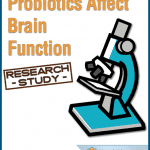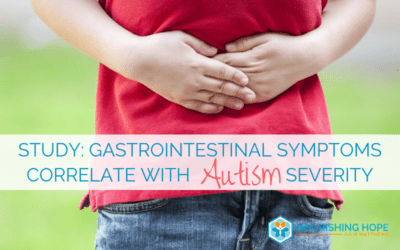Digestion/Microbiome
Diet and nutrition are essential for good health, and this is especially true for digestive health. Food directly affects the gastrointestinal system, and can cause digestive symptoms. Additionally, the gut and brain are connected. The health of the gut can affect children’s health, as well as their mood, learning, and behavior. Digestive issues such as diarrhea, constipation, gas, bloating, and pain are very common in children with autism, ADHD, and other conditions.
Explore our articles on diet and nutrition intervention for digestive disorders and improving digestive symptoms.
Probiotics Affect Brain Function: Research Study
A recent study on women showed that probiotic bacteria positivity affect emotion and brain function in many areas. Dr. Tillisch states "Time and time again, we hear from patients that they never felt depressed or anxious until...
Study: Gastrointestinal Symptoms Correlate with Autism Severity
It has long been known by parents (and many health professionals), that children with autism have higher prevalence of gastrointestinal (GI) issues. Ask any parent of a child with autism, and they will likely tell you that...
New Study: Research Finds Higher Rates of Gastrointestinal Illness (and other Medical Conditions) in Autism and ADHD
Hooray, another scientific study that validates what autism parents and biomedical autism practitioners have known for years: that children with autism have higher rates of medical conditions. Autism parents globally have shouted...
Fermented Foods Are Important To Autism Diet
Digestive issues are common in autism spectrum disorders, and fermented foods are a helpful dietary component for supporting and balancing the digestive system. In fact, beneficial bacteria in these foods support many body...
Encouraging a Sauerkraut Lover
We love cultured vegetables in our home. We enjoy making them and look forward to the day when Ruby can assist. I've taught many classes on making sauerkraut and kids love to help--crushing the cabbage with their bare...
Probiotics and Colic
A study in Pediatics found a decrease in colic in exclusively breastfed infants with the introduction of the probiotic, lactobacillus reuteri. The study concluded, "L. reuteri DSM 17 938 at a dose of 108 colony-forming units per...
Splenda – Important to Avoid for Children with Autism and GI Disorders
In a study conducted by Dr. Mohamed B. Abou-Donia, et al. and published in the Journal of Toxicology and Environmental Health, the artificial sweetener Splenda was found to have several health concerns. According to the study on...
Scientists make Gut-Brain Connection to Autism and Harvard Professor validates Diet & Nutrition approach for Autism
Martha Herbert, assistant professor in neurology at Harvard Medical School, is a brilliant researcher and doctor. The thing I love most about her is her heart and understanding of the interplay of the environment and...
Fermented Foods that Heal
Fermented foods are live lactobacillus (the bacteria found in yogurt) fermentation - foods naturally fermented with good bacteria to help break them down and aid digestion. A majority of children on the autistic spectrum...






